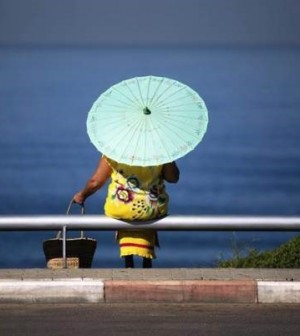- Finding Unshakable Power in a World That Wants to Pull Us ApartPosted 6 months ago
- What could a Donald Trump presidency mean for abortion rights?Posted 6 months ago
- Financial Empowerment: The Game-Changer for Women in Relationships and BeyondPosted 7 months ago
- Mental Health and Wellbeing Tips During and After PregnancyPosted 7 months ago
- Fall Renewal: Step outside your Comfort Zone & Experience Vibrant ChangePosted 7 months ago
- Women Entrepreneurs Need Support SystemsPosted 7 months ago
Struggle, suffering mark lives of nearly 2 billion women - survey

By Lisa Anderson from trust.org
NEW YORK, March 4 (Thomson Reuters Foundation) – Nearly 2 billion of the world’s women are struggling or suffering in their daily lives, while 620 million describe themselves as thriving, according to a Gallup poll released on Wednesday.
Based on interviews conducted with women and men in 160 countries in 2013, the survey found that 61 percent of women globally were struggling, 26 percent thriving and 13 percent suffering – numbers that have remained virtually the same since Gallup began doing the Life Evaluation Index in 2006.
“One of the surprising things is how much parity there is between how men and women evaluate their lives,” Jon Clifton, managing director of the poll, told the Thomson Reuters Foundation.
While men and women shared a similar perception of the overall quality of their lives, they diverged when it came to employment and safety.
In a global workforce composed of 50 percent more men than women, men are twice as likely than women to be employed full time, according to the poll.
“That gap is still there and it’s as large as it’s been for the last five years,” said Julie Ray, co-author of the report.
The perception of personal safety also differed between men and women. Asked if they felt safe walking alone at night in the city or area in which they lived, 70 percent of men said they felt safe compared with 59 percent of women, Clifton said.
Countries where women rated their lives the worst in terms of suffering tended to be those experiencing political or economic instability, or conflict.
Bulgaria and Afghanistan topped that list, followed by Armenia, Greece, Ukraine, Cambodia, Hungary, Turkey, Egypt and Madagascar.
Particularly notable were Afghanistan, where no women rated their lives as positive enough to be considered thriving, and Syria, where women had the lowest positive experience score measured since Gallup began doing the poll.
The highest percentages of women considered to be thriving were in primarily wealthy, developed countries. Iceland and Sweden led the global list, followed by Denmark, Canada, Finland, Australia, the United States, Austria, Costa Rica and New Zealand.
Another surprising finding in the survey was that, regardless of their circumstances, most women said they experienced positive emotions on any given day, the researchers said.
Questioned about the day before their interview, 84 percent of women globally reported that they were treated with respect; 75 percent smiled or laughed a lot; 74 percent enjoyed themselves; 70 percent were well-rested and 50 percent learned or did something interesting.
By comparison, when asked about negative emotions on the day before their interview, only 35 percent of women worldwide reported feeling worry; 32 percent stress; 29 percent physical pain; 22 percent sadness and 20 percent anger.
“The overall takeaway for me is that despite what women in various countries are experiencing, these data show that there is no shortage of hope,” said Ray.
The researchers questioned 125,839 adults, of whom 66,313 were women, in 136 countries and areas.
(Reporting by Lisa Anderson, Editing by Maria Caspani)






